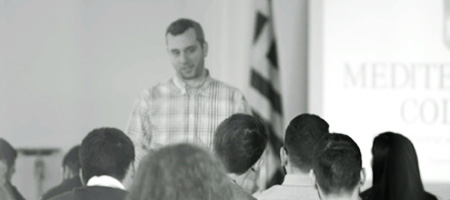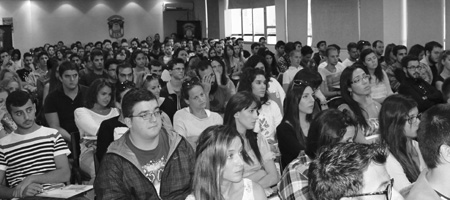
BSc (Hons) Computer Networks & Security
- The only undergraduate programme in Greece that focuses on both Networks & Security.
- Incorporates the syllabus for Cisco’s industry recognised CCNA certification.
- Opportunity to pursue the CCNP & CCNA Security certifications with subsidised fees at our Cisco Academy.
- The Networks courses are delivered in certified Cisco Academy Computer Networks Labs, with wireless and conventional equipment.
- Special modules on Network Security and Ethical Hacking.
- Students undertake projects and develop applications for real businesses.
Computer Networks Security



Course Information
Organisations need to ensure that the information they hold and transfer across networks is secure and confidential. However, numerous breaches of security and incidents of hacking have demonstrated that this is an ongoing battle for businesses, which in turn created a demand for graduates skilled in networks and security.
The BSc (Hons) Computer Networks and Security course will prepare you to become a successful networks or security specialist. You’ll learn the technical skills to be able to specify and build the physical infrastructure and the software development skills to make sure that solutions are robust and secure.
You will study switching, routing and wide-area networks, wired and wireless networks, Cisco and Microsoft networks. You’ll also be able to understand security issues and to critically analyse and evaluate responses to security-related problems. In addition, you will look at the theory and implementation of wired and wireless networks, network management, network security, network applications development and security protocols.
The programme addresses high school graduates who wish to build a career in Computer Networks.
Requirements for registration:
- High School leaving certificate (Apolyterion) from a General or Vocational Senior High School (or equivalent)
- Reference Letter (1)
- Adequate knowledge of English (IELTS 4.5 or equivalent) *
- Academic Interview
- Photos (2)
- ID-Card/ passport
*The level of English required for the English-taught programme is equivalent to IELTS 6.0 or B2. Candidates without official English language certificates can sit the English language placement test of Mediterranean College.
Holders of Higher National Diplomas (HND), students of Technological (TEI) or Higher Education Institutions (AEI) of relevant fields may be admitted to an advanced stage of the course, upon a Recognition of Prior Learning procedure. They need to additionally submit:
- Diploma and/or academic transcript
- Programme Handbook (if available)
This course comprises 20-credits modules, except for the diploma thesis of the 3rd year that equals to 40 credits. Most of the modules are semester-based, while there are few yearlong ones. First year modules and 50% of the 2nd year modules are taught & assessed in Greek, while the remaining modules are taught & assessed in English. (Note: This programme is also delivered entirely in English).
The course focuses on three pillars: the Technical, where students learn how to design and develop computer networks; the Programming, where students cultivate the necessary skills to design safe and secure solutions; the Business, where students learn how to design appropriate networks for potential businesses.
Students specialise in local and wide area networks, conventional or wireless networks. Other modules focus on security management, software applications development and databases. The highlight of the programme is that it incorporates the CCNA certification syllabus as well as Ethical Hacking content (with the opportunity to obtain the relevant certification).
| Year 1 | Year 2 | Year 3 |
| Introduction to Computer Science | Networks and Security | Server Infrastructure |
| Computational Mathematics | Databases | Advances in Wireless Networks |
| Programming I | Ethical Hacking | Distributed Networks |
| Networking Fundamentals | Network Routing & Switching | Security Protocols |
| Foundations of Computer Science | Wide Area Networks | Independent Studies |
| Programming II | Team Project | |
| English I | English II |
You’ll learn through a mixture of lectures, tutorials and laboratory work. A considerable amount of e-learning support material is also provided. There will be a strong emphasis on practical networking skills and you’ll use cutting-edge hardware, software and simulators in our Cisco Academy labs. The learning methods we use are:
- Lectures, to cover theory.
- Seminars, to solve problems and practical exercises.
- labs, to apply theory and get “hands on” training in networking.
- clinics (supporting classes), to tackle the most difficult parts of the modules.
- tutorials, to provide one-on-one support to students.
- independent learning, where students engage in self-directed study.
Assessment is done mostly through coursework, although in each year there are a small number of computer-based exams. In the final year, one-third of the assessment is for a personal project. Specifically, assessment is based on:
- Individual course-work
- Team projects
- Presentations
- Computer-based exams
The learning experience is further enriched through the activities of the School of Computing.
- It is the only undergraduate Computer Networks programme in Greece, which recognises the inseparable nature of networks and security and equally focuses on security, leading to well-rounded networks professionals.
- The course’s modules on networks are delivered in large-scale networks simulators, in the Cisco Academy certified Labs, where students get in touch with Cisco devices which will later use in the industry (since Cisco is the largest networks equipment supplier worldwide).
- The course incorporates the Cisco CCNA syllabus certification and Ethical Hacking skills, and prepares students to acquire the relevant certifications. Students have the opportunity to pursue the CCNP & CCNA Security certifications with subsidised fees at the Mediterranean College Cisco Academy.
- The programme is delivered inboth Greek and English, so that students are gradually and smoothly introduced to studying in English. English lessons are provided during the 1st and 2nd year of study, specially designed to cover terminology and to help students meet the requirements of the English-taught part of the programme (students therefore do not need additional English tuition). Students receive the support of the College’s English Department throughout their studies. As graduates of a UK University (being taught in English) they certify their English as a foreign language competence at a Proficiency (C2).
- Mediterranean College gives particular emphasis on theacademic support of undergraduate students: a personal tutor is assigned to every student; lecturers are available at office hours; students with difficulties may use the services of the counselling and learning support centre; students receive regular feedback on their academic progress; students have full access to the College’s libraries and electronic resources.
- Mediterranean College has developed an integrated Employability plan, the MC Employability Scheme, focused on the contemporary needs of our Computing students: career counseling and professional development, regular guest lectures, real projects, seminars, networking events, employability fair, internship scheme.
- All academic staff are accredited lecturers of the University of Derby for every module they teach. Mediterranean College implements an integrated system of recruitment, assessment and continuing professional development of academic staff, so that students receive excellent teaching and personal support to develop their social and professional skills.
- The University of Derby (Guardian University Guide 2017) is a TOP-50 UK University and in the TOP-10 for student employability. This stems from constantly developing the curriculum as directed by employers, professional and accreditation bodies.
Graduates of the programme, according to the Greek law, are holders of an accredited university degree, professionally equivalent to those awarded by Greek State Higher Education Institutions. If they wish so, they can have their degree recognised by the Greek authorities. Click here for more information on the degree recognition procedure.
After successfully completing the programme, graduates may continue for a Master’s degree at Mediterranean College or at overseas universities. Alternatively, they can seek employment. BSc (Hons) holders may attend the following Master programmes offered by Mediterranean College:
Alternatively, they can specialise in Networks by following a Cisco Academy course (CCNA Security, CCNP) or any other CPD course of Mediterranean Professional Studies.
Computer Networks graduates can build a career in the following sectors:
- Analysis & development of data networks
- Installation & maintenance of data networks
- Application support
- Telecommunications
- Sales of IT solutions
- Business consulting
Testimonials
The 3 years I studied at Mediterranean College, I had the opportunity to further my knowledge and develop a range of personal and professional skills. I also learned how to work as a team to accomplish our goals. All the academic and administrative staff were really supportive and helpful....
Georgios Choutsisvilli, BSc (Hons) Computer Science.
Studying at the University of Derby was an interesting experience, the level of studies is really good but most of all we met people that we became good friends with. I wish all the best for their life and career....
Dimitrios Pozaritis, BSc (Hons) Computer Science
My time at the College was great. I made some great friends there who helped me overcome many problems. I learned a lot from my time there and I want to thank my teachers for supporting me throughout these three years....
Christos Avgerinos, BSc (Hons) Computer Science



